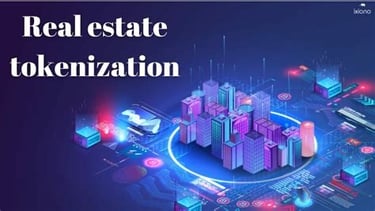Tokenizing Real Estate: Financing Gap for Foreigners in Thailand
Discover how real estate tokenization revolutionizes condo ownership in Thailand, reducing reliance on foreign financing. By digitizing properties into blockchain tokens, this innovative approach empowers local investors, fostering economic stability and community control over the housing market
Author: Mark Kreitzman - over 20 years experience investing in Thailand real estate, crypto/blockchain and cybersecurity expert
5/11/20242 min read


Real estate tokenization presents a groundbreaking solution to the pervasive issue of foreign financing of condos in Thailand, offering a pathway towards greater local empowerment and economic stability. By digitizing physical properties into blockchain-based tokens, this innovative approach holds the potential to reshape the landscape of condominium ownership and investment in the country, while addressing concerns surrounding foreign investment.
At the heart of the matter lies the challenge that Thai banks do not offer mortgage financing to Thai foreigners to purchase condo’s. This requires the foreigner to have the free cash to pay for a condo in full, or finance in their home country which can be expensive between interest rates and currency conversion fees, or they are married to a Thai citizen and risk putting the real estate in their name. Interested buyers must way the risk between putting out all that cash versus what else they could do with that money.
Real estate tokenization offers a compelling alternative by democratizing access to condo ownership and investment opportunities. By tokenizing condominium units, local residents and investors can participate directly in property ownership, fostering a sense of community ownership and control over the housing market. Tokenization also allows for financing from interested investors from all over the world, from rich to poor who have say $100 to spare and like the idea of owning a fraction of a property in paradise.
This decentralized approach not only reduces dependence on foreign financing but also promotes economic resilience and sustainability. Local communities can mobilize resources to fund condominium projects, thereby retaining greater autonomy and mitigating the risks associated with external economic fluctuations.
Moreover, real estate tokenization facilitates transparent and efficient transactions, streamlining the process of buying, selling, and investing in condos. Blockchain technology ensures secure and immutable records of ownership, enhancing trust and confidence in the market while reducing transaction costs and administrative burdens.
In addition to economic benefits, real estate tokenization holds the potential to drive social impact and community development. By enabling local residents to participate in condo projects through tokenized ownership, it promotes inclusive growth and empowers communities to shape their built environment according to their needs and priorities.
Furthermore, tokenized governance mechanisms allow for democratic decision-making and collective oversight of condo developments. Local stakeholders can have a say in project planning, design, and management, ensuring that developments align with community values and aspirations.
Ultimately, real estate tokenization offers a viable path forward for addressing the challenges associated with foreign financing of condos in Thailand. By democratizing access to property ownership, promoting economic sustainability, and empowering local communities, it holds the key to unlocking a more inclusive and prosperous future for the country's real estate market.


